This post took a long time coming. I started writing this last Christmas, encountered some technical issues 😉 and it was put on the back burner. So the other day when a friend asked to write an Indian recipe for Christmas, this got dusted up. It was all the excuse I needed to make this cake again. For those who are not familiar with it Baath or Bathika cake is a traditional cake from Goa, India. It is made with fine semolina (sooji), coconut and sometimes flavored with aromatic spices. Traditionally this cake was baked at homes in a stove top clay oven with hot coals placed on the lid .

Semolina is used often in the Goan/Maharashtian cuisine. It is the preferred coating for fried fish, the main ingredient for quick breakfast or snack like upma, and let’s not forget the popular quick desert – kesari or Sooji ka halva (sheera). Is it any wonder that with the Portuguese influence the people of Goa created this wonderful cake made out of semolina and the other local ingredients ?
This is not a cake that I grew up with. In Kerala X’mas was characterized by the traditional rich fruit cake with a glass of home made wine to add to the festivities. From a baker’s view point this is an interesting recipe as the main ingredients were coarse – fine semolina, and grated coconut. In order to get a moist cake that does not fall apart, the batter needs to absorb all the moisture and flavors before hand. Hence the long resting time before baking. The flavors meld and mature creating a delicious cake that crumbles in your mouth. A true Baath cake needs at least 6 hours of resting time.
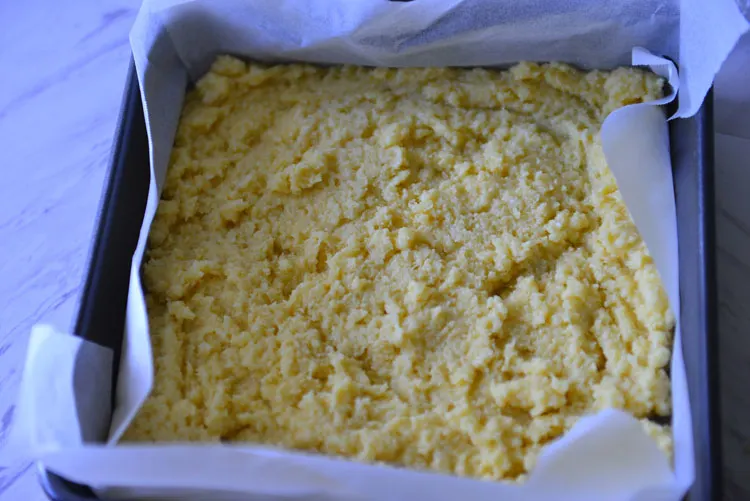
The traditional recipes call for over night resting on the counter top, risking the wrath of food safety experts. Before you reach for the pitchforks consider this, in the days before commercialized agriculture the eggs came from one’s own backyard, making salmonella poisoning virtually unheard of… And my guess is that decades back the December temperatures in Goa would have been considerably cooler. But in an abundance of caution I would say rest the batter in the refrigerator. The added advantage is that it gives you the flexibility to bake according to your schedule, as you can leave the batter in the fridge for up to 24 hours .
Mix the cake batter and pour it into the baking tray, already greased and floured or lined with parchment paper. I like to line mine with parchment paper with a little bit of overhang. This is entirely for utility purposes – pull up the parchment on opposite sides and the cakes comes out easily. Cover the pan with an airtight lid or plastic wrap ( or aluminium foil) and keep in the fridge until you are ready to bake. When ready to bake take it out of the fridge and rest on the counter while the oven is preheating.
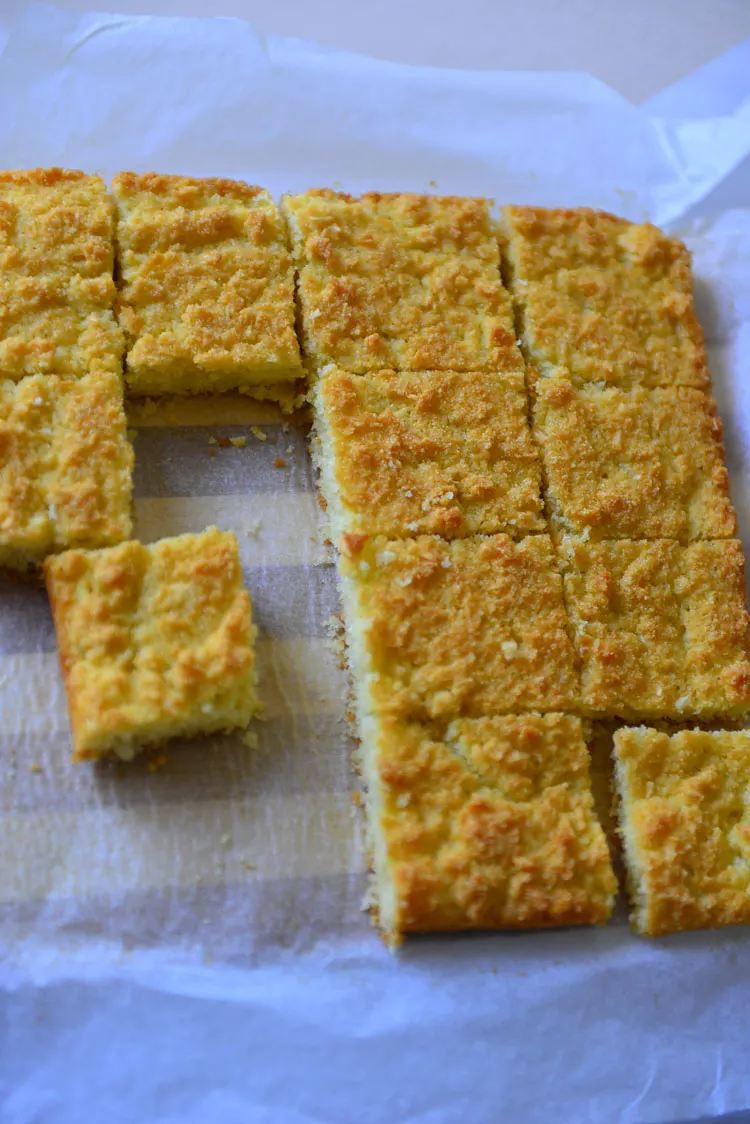
I like the texture of these cakes. It is not overly soft and smooth, but more rustic. If you prefer a smooth top you could add a few table spoons of water/coconut milk to thin the batter. But that is a decision you make when you make the batter, as the moisture content of the fresh ingredients missed the memo on the acceptable water content. Kidding aside when you see the picture of the batter above you know that the top is not going to be smooth . Even at that point you could use a pastry brush (or a small spoon) dipped in water to add more moisture to make the top smooth and even.
Baath recipes call for a little AP flour (maida) as a binder. A little milk is added to the batter as well. There are some recipes that add extra milk and proceed to bake without resting. I am sure all these recipes will yield delicious cakes, but the extra milk makes a dense cake rather than one with light airy crumb. I have cut down a little on the sugar, a little, as I want the textures and flavors to be be prominent and not masked by the sweetness.
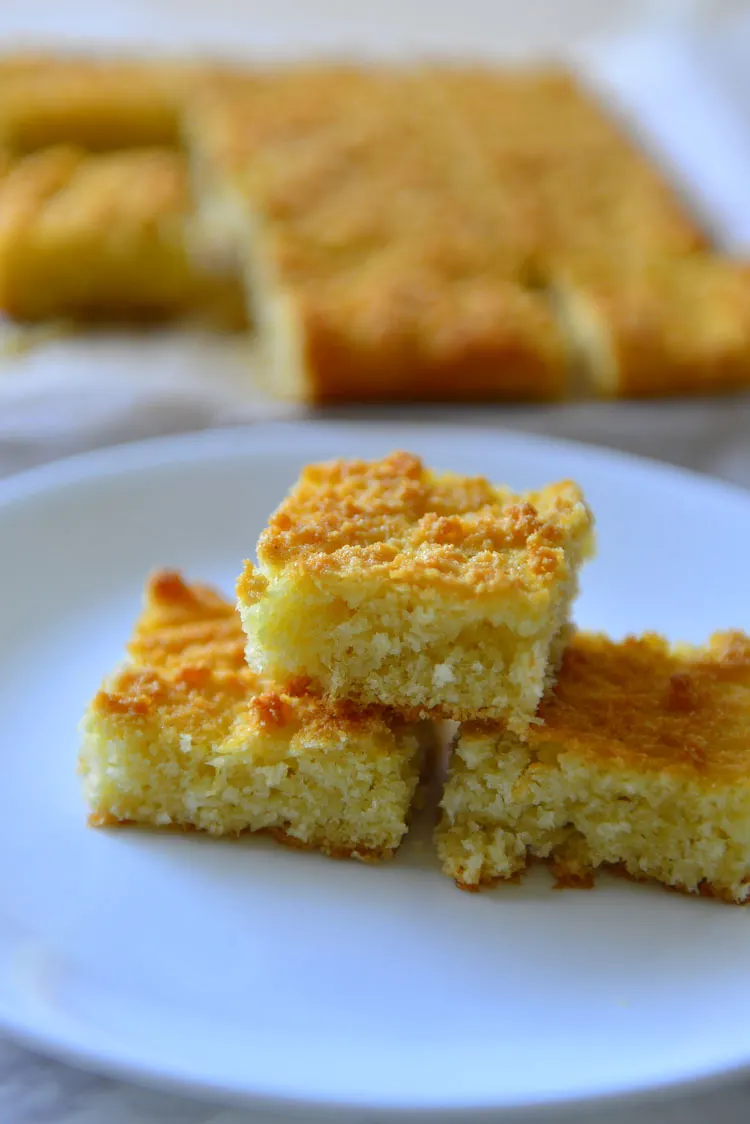
Yum , now if only I had any home made wine left over !!
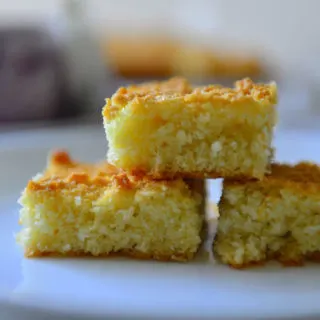
Goan Baath Cake
Ingredients
- 1 C Fine Semolina 160 g
- 2 C Fresh Finely Grated Coconut - lightly Packed 160 g
- 3/4 C Fine Sugar 170 g
- 2 Eggs Large
- 2 Tsp Baking Powder
- 1/4 C Coconut Oil or Butter
- 1/2 C Milk/Coconut Milk
- 1/2 Tsp Salt
- 1 Tsp Vanilla essence
Instructions
Prep
- Bring all the ingredients to room temperature before making the batter. Butter or oil an 8 in X 8 in square cake pan or line it with parchment paper.
Make the batter
- Cream the butter/oil with the sugar until light and airy. Add the eggs one by one and beat till pale yellow and fluffy. Mix in the vanilla essence.
- Mix the fine semolina with the baking powder well and stir in the coconut.
- Fold in half the dry mix into the eggs. Add half the coconut milk/milk and stir to combine. Fold in the remaining dry mix. If the batter looks very dry add the remaining liquid. The batter should be of dropping consistency rather than pouring consistency.
- Transfer to the baking pan and level off the top.
- Cover tightly with a lid and let rest for 6 hours to overnight preferably in the fridge.
Bake
- When ready to bake remove the cake pan from the fridge. Place the oven rack a little below center and pre-heat the oven to 325°F. Let the cake batter rest on the counter while the oven is preheating.
- Transfer the pan to the oven and bake for 40 to 50 minutes or until done. Cake is done when a tooth pick inserted in the middle comes out clean and the tops are browned evenly .
- Remove from the oven and transfer to a cooling rack. Cool completely before slicing.
Notes
- Oil makes a more moist cake.
- Instead of vanilla add 1/2 tsp fresh cardamom powder or 1/4 tsp fresh nutmeg for more of local flavors.
- Use finely grated coconut, not long coconut threads.
Important: Nutrition Values are estimates. Actuals vary based on ingredients and serving size.
Notes : Fresh shredded coconut imparts the beast flavors. If using dry coconut use lightly packed 1 C coconut and add 1 C coconut milk or water to the recipe.
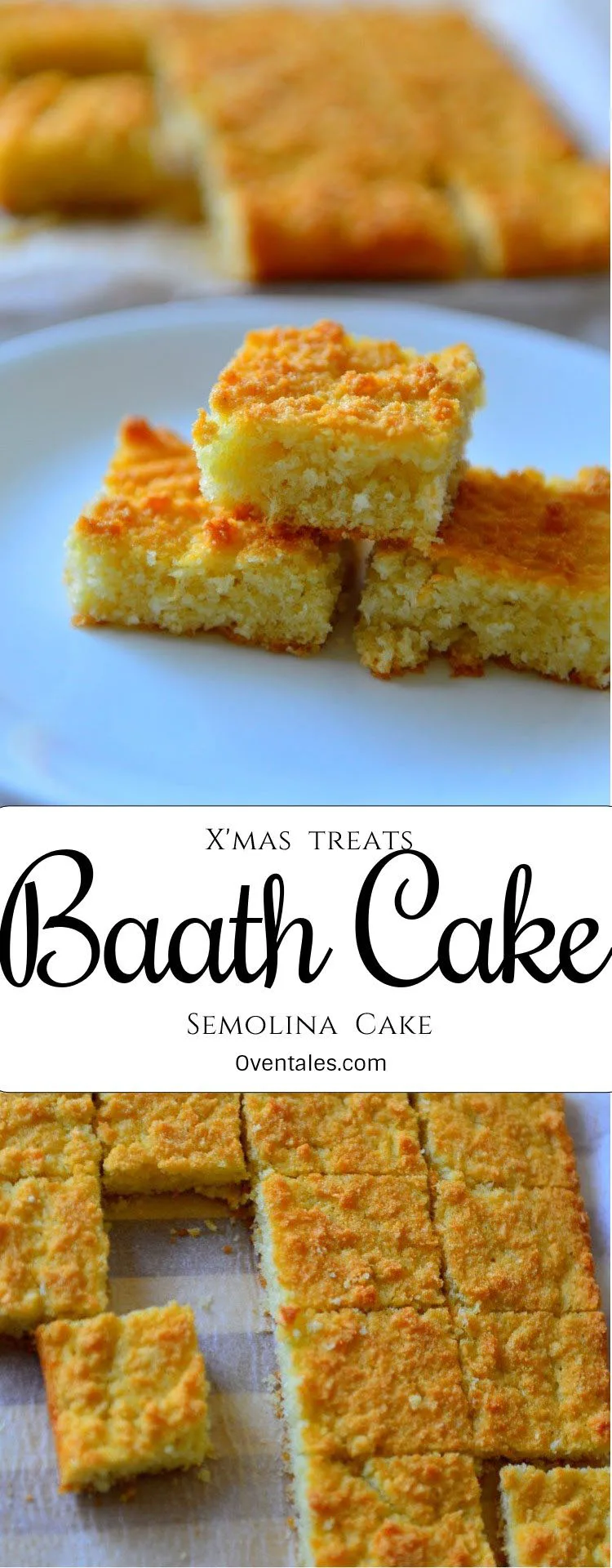
Check out these other X’mas treats ..


Christine loy
Friday 11th of February 2022
Hi syama, I used desicated coconut, but I made a mistake I meant to use water, but ended up using ordinary milk. Will it turn out ok. I followed your notes at the bottom of the receipe.
Syama
Sunday 13th of February 2022
It should be OK. How did it turn out?
Mariel
Saturday 5th of February 2022
In your notes, It states if using dry coconut rather than fresh, add 1 cup of water or coconut milk. Does that mean in total I'm to use 1 1/2 cup of water or coconut milk or just 1 cup total?
Syama
Sunday 13th of February 2022
Total 1 C, sorry for the confusion
Rukhsana
Sunday 19th of September 2021
Thank you for this recipe!! My Dadi (grandmother) used to bake something very similar to this, and my sister and I have been trying replicate it for years. Eating this cake took us back to our childhood. Thank you so much for sharing!!
Lorraine
Wednesday 17th of February 2021
I clicked on the Instagram button to follow you and it went to another person called Shyam Nair. You may want to fix it
lorraine
Friday 19th of February 2021
@Syama, no it wasn't. It was a dancer and all of the post are on dancing :-)
Also I have another question - in your narrative you wrote that the addition of milk makes the cake dense but I see the use of milk in your recipe, so will it not be dense?
Syama
Thursday 18th of February 2021
Thank you for being eagle eyed ang getting in touch! But there is nothing to worry, it is my account.. - Syama.
Nichel
Sunday 13th of December 2020
How long can this cake be preserved at room temperature in humid climate after baking?
Syama
Monday 14th of December 2020
The short answer is - it depends. In any case I would not recommend keeping a cooled cake unprotected for more than a few hours. Cool completely and store in an airtight box (or wrap tight using wax paper) and it should last for 2 to 3 days at room temperature. Anything more will depend on the environment. Keeping the environment dry and contaminant free is very important. Hope that gives you an idea. Thanks, Syama.